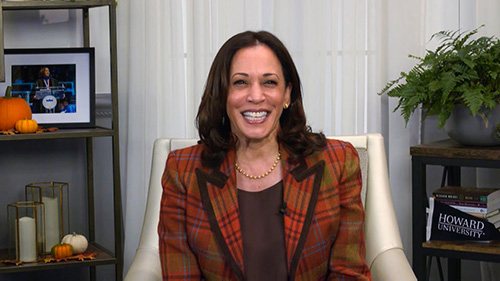On February 27, 2016, Harris won 78% of the California Democratic Party vote at the party convention, allowing her campaign to receive financial support from the party.
Three months later, Governor Jerry Brown endorsed her. In the June 7 primary, Harris came in first with 40% of the vote and won with pluralities in most counties. Harris faced representative and fellow Democrat Loretta Sanchez in the general election. It was the first time a Republican did not appear in a general election for the Senate since California began directly electing senators in 1914.On July 19, President Barack Obama and Vice President Joe Biden endorsed Harris. In the November 2016 election, Harris defeated Sanchez with over 60% of the vote, carrying all but four counties. After her victory, she promised to protect immigrants from the policies of President-elect Donald Trump and announced her intention to remain Attorney General through the end of 2016.
Harris supported busing for desegregation of public schools, saying, “the schools of America are as segregated, if not more segregated, today than when I was in elementary school.” She viewed busing as an option to be considered by school districts, rather than the responsibility of the federal government.Harris was an early co-sponsor of the Green New Deal, a plan to transition the country towards generating 100 percent renewable electricity by 2030.
In March 2019, after Special Counsel Robert Mueller submitted his report on Russian interference in the 2016 election, Harris called for U.S. Attorney General William Barr to testify before Congress in the interests of transparency. Two days later, Barr released a four-page “summary” of the redacted Mueller Report, which was criticized as a deliberate mischaracterization of its conclusions. Later that month, Harris was one of 12 Democratic senators led by Mazie Hirono to sign a letter questioning Barr’s decision to offer “his own conclusion that the President’s conduct did not amount to obstruction of justice”, and called for an investigation into whether Barr’s summary of the Mueller Report and his statements at a news conference were misleading.
On May 1, 2019, Barr testified before the Senate Judiciary Committee. During the hearing, he remained defiant about the misrepresentations in the four-page summary he had released ahead of the full report. When asked by Harris whether he had reviewed the underlying evidence before deciding not to charge Trump with obstruction of justice, Barr admitted that neither he, Rod Rosenstein, nor anyone in his office had reviewed the evidence supporting the report before making the charging decision.
Harris later called for Barr to resign, accusing him of refusing to answer her questions because he could open himself up to perjury, and saying his responses disqualified him from serving as U.S. attorney general. Two days later, Harris demanded again that the Department of Justice inspector general Michael E. Horowitz investigate whether Barr acceded to pressure from the White House to investigate Trump’s political enemies.
Photo Credit: Shutterstock







Add Comment